The conflict in Ukraine has lasted for almost two years. The fighting between Israel and Hamas in the Gaza Strip has lasted for two months. The question haunting the international community and people in the countries involved is: when will the war end and in what form?
 |
| Negotiation is an important solution to end conflicts and wars, reduce losses for all parties, and benefit world peace , but the beginning and process are very difficult and complicated. (Source: Getty Images) |
Negotiations are complex and depend on many factors.
In the past, wars often ended in a “blackout”, with one side being knocked out, unable to continue operations, accepting changes in political regimes, and having their territories divided. In recent decades, there have been cases of negotiations ending wars. Why and what conditions lead to negotiations?
Firstly , new types of war have emerged, with complex developments and outcomes that are difficult to predict. In new types such as unconventional war, proxy war, complex war, etc., the role and impact of non- military activities (economic, diplomatic, cultural, information and communication, etc.) are increasingly important. The weaker side can use "asymmetric" tricks and measures, reducing the difference in total strength, bringing the war into a stalemate and prolonging it. The stronger side cannot easily win in a short time, and may even get bogged down. It may win, but then the war breaks out again.
The involvement and impact of external factors are increasingly affecting the balance of power and the situation of the conflict. Western aid, weapons, financial, political, diplomatic support... are indispensable factors for Ukraine to defend, conduct counterattacks, hoping to reverse the situation on the battlefield. Hamas receives direct and indirect support from armed Islamic organizations Hezbollah, Houthi and Iran... to reduce the power gap with Israel to some extent, in order to seek an acceptable outcome.
Those factors make the conflict easily prolonged, possibly bogged down, with unpredictable developments and outcomes, forcing the parties to consider other options.
Second , the catastrophic consequences, multi-dimensional impacts, are difficult to measure in many countries and regions. All sides may suffer military, political, economic, diplomatic losses, etc.; large numbers of civilians will die, infrastructure will be destroyed, leaving great economic and social consequences for many generations.
Not only the countries directly involved in the war, but also the region and the world are affected. Sanctions and embargoes force many countries to choose sides, causing division, dispersing resources, disrupting the global supply chain, leading to economic recession. The influx of refugees and migrants causes social instability in many countries.
The longer the conflict lasts, the greater the negative impact. The development of information and communication makes the world feel the consequences of war more quickly, intuitively, specifically and clearly. This forces leaders to carefully consider decisions related to conflicts.
Third , the multifaceted consequences promote the anti-war movement, calling for ceasefires and peace negotiations in the warring and involved countries and in many other countries in the region and around the world. That creates significant pressure on governments and international organizations, especially the parties directly involved in the war. Demanding that the parties take action, towards a ceasefire, negotiations, and finding solutions to end the conflict.
Major powers play a very important role in promoting negotiations. However, the fact that some major powers take advantage of war to weaken their opponents, force other countries to depend on them, and compete for influence and strategic positions will hinder a negotiated solution.
Fourth, it is difficult but there is still hope. The ability to negotiate and the negotiation process depend on many factors, both internal and external, objective and subjective. The correlation of power, purpose, goal, strategy, and tactics of the parties is a direct deciding factor. The higher and more opposing the goals, the lower the ability to negotiate and the more complicated and prolonged the negotiation process.
The most difficult thing is that the positions of the two sides are too far apart, even opposing. The weaker side often wants to negotiate, but tries not to lose too much. The stronger side wants to win completely; it only accepts negotiations when it suffers significant losses, faces strong opposition, has difficulty winning in a short time, and risks getting bogged down.
| The most difficult thing is that the positions of the two sides are too far apart, even opposing. |
Negotiations are aimed at ending conflicts in the most beneficial way, but can also be used to gain time to consolidate forces, limit the opponent's momentum of attack, or to deal with domestic and international pressure. The negotiation process can be interwoven with military activities, putting pressure on the opponent, forcing them to accept unfavorable conditions.
Political changes in the warring countries, or in the major countries directly involved, can affect the possibility and progress of negotiations. If the side that favors resolving conflicts by non-military means gains power, the possibility of promoting negotiations is greater, and vice versa.
Thus, negotiation is an important solution to end conflicts, reduce losses for all parties, and benefit world peace, but the beginning and process are very difficult and complicated. In addition to common factors, the development also depends on the specific situation of each war.
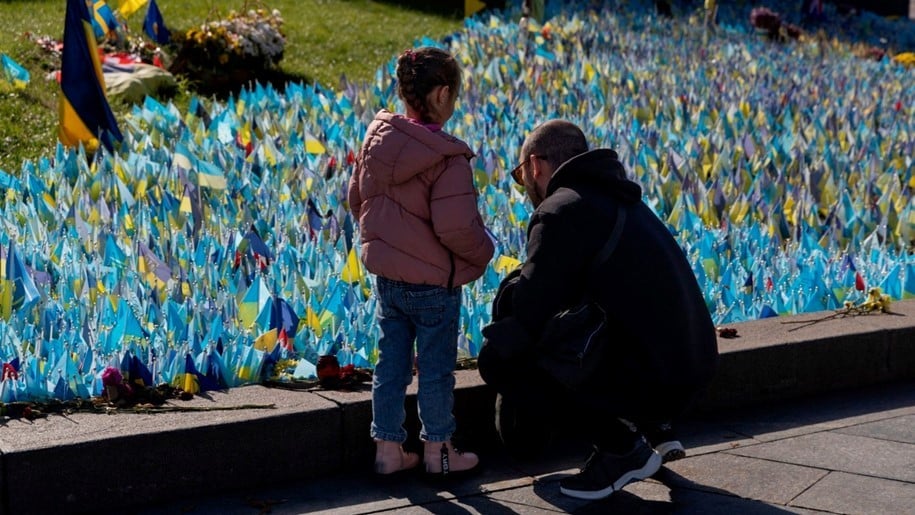 |
| A memorial to Ukrainian soldiers killed in the conflict with Russia at Independence Square in the capital Kiev. (Source: AP) |
Negotiations in Ukraine are still far away.
Up to now, Russia has basically kept Crimea, the areas of the two separatist autonomous republics have been annexed and expanded some important areas; economic and social instability has not occurred; a part of Ukraine's military and economic potential has been consumed... But the goal of demilitarization and neutralization in Ukraine has not been basically achieved. Russia has also suffered significant losses and consumed a lot of resources.
The attacks on targets deep inside Russian territory, causing material damage, exposed the limitations of the defense system, and had a certain impact on the psychology and spirit of the people. Relations between Russia and the EU almost stagnated. Conflicts between countries that were once members of the Soviet Union and the Warsaw Pact and Russia are increasingly deepening. Some of Russia's close partners in Central Asia and the Caucasus tend to lean towards the West.
Russia is trying to control the occupied areas and expand to some important targets. Developing a large-scale offensive into most of Ukraine, requiring the mobilization of many forces, could make things more difficult for Russia. Continuing the war of attrition, stimulating the factors causing political and social upheaval in Ukraine, forcing Kiev to accept the conditions, could be a good option. But it is not excluded that Moscow will be bogged down and fall into the West's intentions.
Ukraine’s counter-offensive has largely failed to achieve its goals. There are signs of internal rifts between some military generals and President Zelensky’s government, and between some EU countries and Ukraine. The West is still committed to providing weapons and financial aid to Ukraine, but at a slower pace. There are signs that some countries want Ukraine to negotiate with Russia and are willing to act as intermediaries. However, Ukraine is determined to fight back, hoping to reverse the situation.
Winter is not favorable for expanding military activities, mainly tactical activities, sabotage, air raids, which are unlikely to lead to a military breakthrough. The battlefield situation is not clear, both sides still declare firmly, determined not to retreat and there is no clear sign of negotiations. But the conflict cannot be prolonged forever. If there is no military settlement, other options will have to be considered.
Although it is difficult to predict the timing and outcome of negotiations, several scenarios can be proposed. First, Russia gains the upper hand, but not enough to end the conflict victoriously. Ukraine suffers heavy losses, faces many difficulties, is under great pressure from both inside and outside, and must accept a ceasefire and negotiations. Second, Russia suffers losses, faces many difficulties, is under great pressure from outside, reaches a ceasefire and negotiations, but still keeps the “new territory”. Third, the war is deadlocked, and both Russia and Ukraine compromise on a long-term peace agreement.
The second scenario is less likely to happen; the third scenario is even less likely. The negotiation process must go through many steps, starting with a temporary or permanent ceasefire, a “freeze of conflict” with specific conditions. Accepting a ceasefire, a “freeze of conflict” is very difficult, but a breakdown is easy, from any side.
The fundamental problem is that Ukraine finds it very difficult to accept giving up its territory. Unless there is a sudden change on the battlefield, a political change internally, and the West intervenes and limits the supply of weapons and finance to Ukraine. According to Mr. Chau Luc, former Deputy Head of the Party Central Committee's Foreign Affairs Department, member of the 13th Chinese People's Political Consultative Conference's Foreign Affairs Committee, the key to resolving the conflict in Ukraine lies in the hands of Western countries. But so far they have not made any move. Perhaps Russia will accept a compromise with the West. But this is also very difficult.
It can be said that the negotiation scenario is still far away and unlikely to happen in the near future. If there is no breakthrough, the earliest negotiation time could be in the last months of 2024, when the battlefield situation is clearer and after the 60th US presidential election.
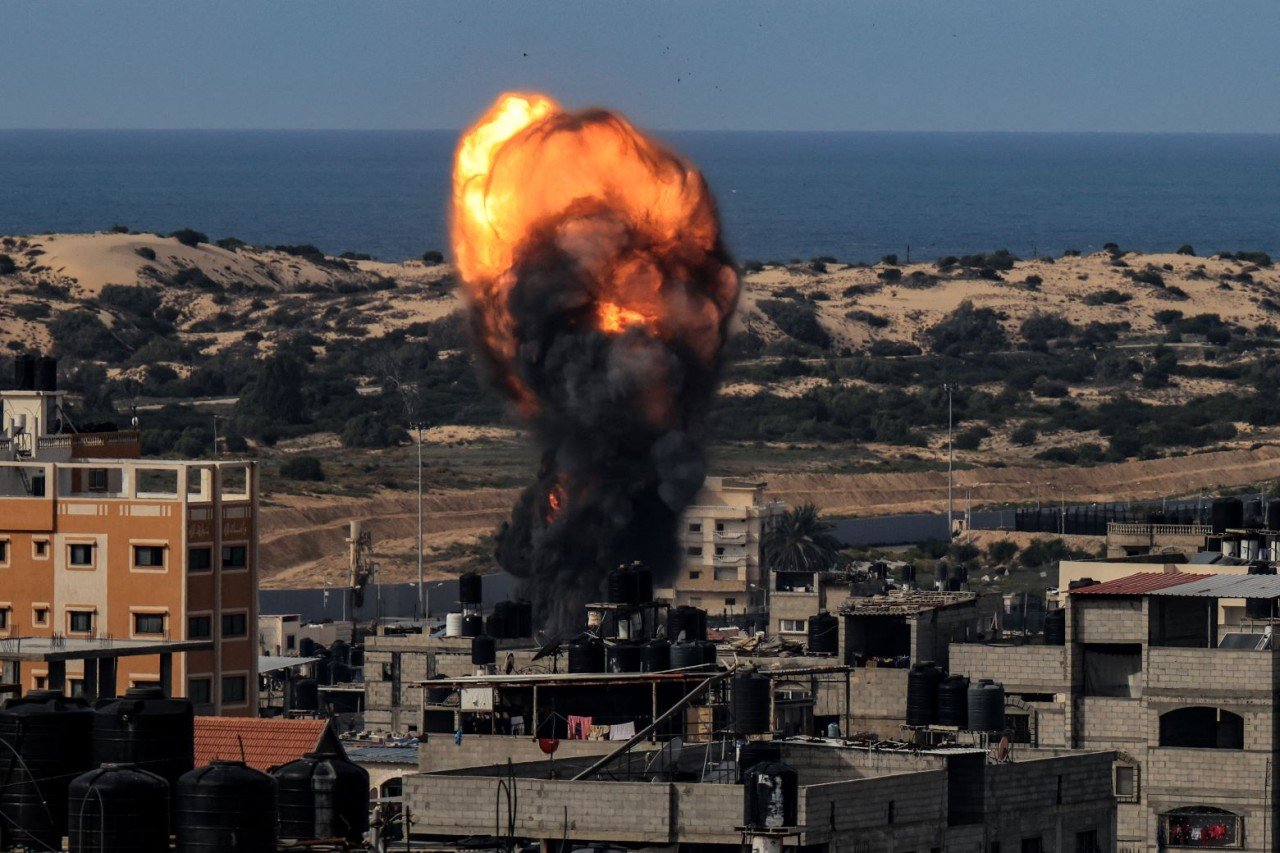 |
| A fireball rises above a building during an Israeli strike in Rafah, Gaza on December 9. (Source: AFP) |
Gaza Strip, fragile hope
The precious and rare 7-day ceasefire ended. Immediately after, there was an unprecedented fierce fighting. Not too surprising, because this is the most complex, long-lasting and difficult conflict to resolve in the world, leading to more than 6 wars in the Middle East and many bloody clashes.
This situation is due to three main reasons. First, the deep, complicated, overlapping, persistent, historical contradictions regarding territory, ethnicity, culture, religion... Its nature is a conflict over the right to coexist between two states and two peoples, which is very difficult to resolve. Second, the internal contradictions between factions in Israel and Palestine, preventing the government from "crossing the line", compromising, and finding a breakthrough solution to resolve the contradiction. Third, the calculation of strategic interests of countries in the region and other countries, especially big countries. The US and some countries "turned around", not considering Tel Aviv's establishment of resettlement areas in the West Bank as a violation of international law; recognizing Jerusalem as the capital of Israel, further complicates the situation. Different viewpoints and opposing impacts push the negotiated solution further away.
The United Nations and the international community oppose the violence that causes the loss of many civilian lives, calling for an end to the conflict. Israel continues to attack with a wider scope, larger scale, and greater intensity. Israel wants to take advantage of the opportunity, completely eliminate Hamas, manage the Gaza Strip, and prevent long-term military actions against Tel Aviv. Hamas does not accept being eliminated militarily or politically, and resolutely fights back. Palestine wants Israel to stop the war, withdraw from the Gaza Strip, and accept the border as proposed by the United Nations.
Two states coexisting and living together is the only solution to bring peace to Israel, Palestine and the region. However, the goals and positions of Israel and Hamas are opposite. International pressure and actions of other countries, especially big countries, are not strong enough to promote compromise, long-term ceasefire, and negotiations. Some other countries and Islamic organizations may be factors causing the conflict to spread.
Therefore, the hope for negotiations in the Gaza Strip remains fragile. The conflict continues to develop in a complex and unpredictable manner. The time for Israel to achieve its basic objectives in the Gaza Strip, ending the offensive campaign, is from 1 to 2 months. Tel Aviv can consider a negotiation solution based on its strength with preconditions that Palestine will find difficult to accept. The most necessary thing is compromise from all parties, especially Israel.
If the parties do not compromise, the situation will repeat itself as before. The fighting will end for a while, then it may flare up again, like previous wars and conflicts. It is difficult to reach a negotiation, and it is even more difficult to end it in a way that all parties can accept.
Source



![[Photo] Keep your warehouse safe in all situations](https://vphoto.vietnam.vn/thumb/1200x675/vietnam/resource/IMAGE/2025/10/1/3eb4eceafe68497989865e7faa4e4d0e)
![[Photo] Hanoi morning of October 1: Prolonged flooding, people wade to work](https://vphoto.vietnam.vn/thumb/1200x675/vietnam/resource/IMAGE/2025/10/1/189be28938e3493fa26b2938efa2059e)

![[Photo] President of the Cuban National Assembly visits President Ho Chi Minh's Mausoleum](https://vphoto.vietnam.vn/thumb/1200x675/vietnam/resource/IMAGE/2025/10/1/39f1142310fc4dae9e3de4fcc9ac2ed0)









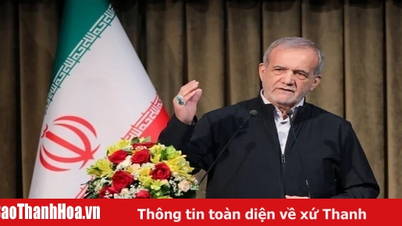













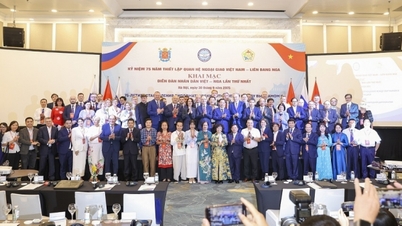

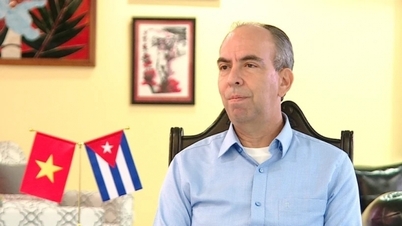































































Comment (0)